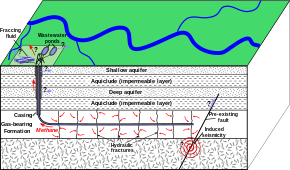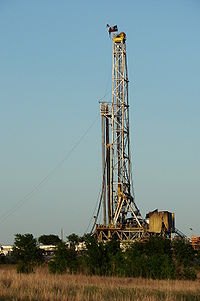User:Oceanflynn/sandbox/Hydraulic fracturing in Canada
 Schematic depiction of hydraulic fracturing for shale gas. | |
| Process type | Mechanical |
|---|---|
| Industrial sector(s) | Mining |
| Main technologies or sub-processes | Fluid pressure |
| Product(s) | Natural gas, petroleum |
| Inventor | Floyd Farris; J.B. Clark (Stanolind Oil and Gas Corporation) |
| Year of invention | 1947 |
| Fracking |
|---|
 |
| By country |
| Environmental impact |
| Regulation |
| Technology |
| Politics |
Hydraulic fracturing in Canada has been common in the petroleum industry since at least the mid-1960s.[1] Massive hydraulic fracturing has been widely used in Alberta since the late 1970s to recover gas from low-permeability sandstones of the Spirit River Formation.[2] The method is currently used in development of the Cardium, Duvernay, Montney and Viking in Alberta, Bakken in Saskatchewan, Montney and Horn River in British Columbia.
In 2012 Canada averaged 356 active drilling rigs, coming in second to the United States with 1,919 active drilling rigs. The United States represents just below 60 percent of worldwide activity.[3]: 21
Hydraulic fracturing fluid
[edit]Under the Canada Oil and Gas Operations Act, the National Energy Board (NEB) requests operators to submit the composition of the hydraulic fracturing fluids used in their operation that will be published online for public disclosure on the FracFocus.ca website.[4]
British Columbia
[edit]In late July 2011 the Government of British Columbia gave Talisman Energy a long-term water licence to draw water from the BC Hydro-owned Williston Lake reservoir, for a twenty-year term.
Gallery
[edit]-
A well from drilling to abandonment
See also
[edit]- Shale gas by country
- List of countries by recoverable shale gas
- Directional drilling
- Environmental impact of hydraulic fracturing
- Environmental impact of petroleum
- Environmental impact of the oil shale industry
- ExxonMobil Electrofrac
Citations
[edit]- ^ J.E.S. Milne and R.D. Howie, "Developments in eastern Canada in 1965," Bulletin of the American Association of Petroleum Geologists, Jun. 1966, v.50 n.6 p.1298.
- ^ Douglas J. Cant and Valerie G. Ethier, "Lithology-dependent diagenetic control of reservoir properties of conglomerates, Falher member, Elmworth Field, Alberta," Bulletin of the American Association of Petroleum Geologists, Aug. 1984, v.68 n.8 p.1044.
- ^ Maugeri, Leonardo (June 2013), The Shale Oil Boom: a U. S. Phenomenon (PDF), The Geopolitics of Energy Project, Belfer Center for Science and International Affairs, Harvard Kennedy School, retrieved 2 January 2014
- ^ NEB 2014.
References
[edit]- "National Energy Board Procedures for the Public Disclosure of Hydraulic Fracturing Fluid Composition Information", NEB, 1 October 2014, retrieved 3 December 2014
External links
[edit]{{commons category}} {{wikinews|Disposal of fracking wastewater poses potential environmental problems}} {{wiktionary}} {{Shale gas|technology=yes}} {{Portal bar|Earth sciences|Mining|Energy|Environment}}
Category:Environmental issues with population Category:Hydraulic fracturing Category:Hydraulic fracturing by country|Canada Category:Mining in Canada
